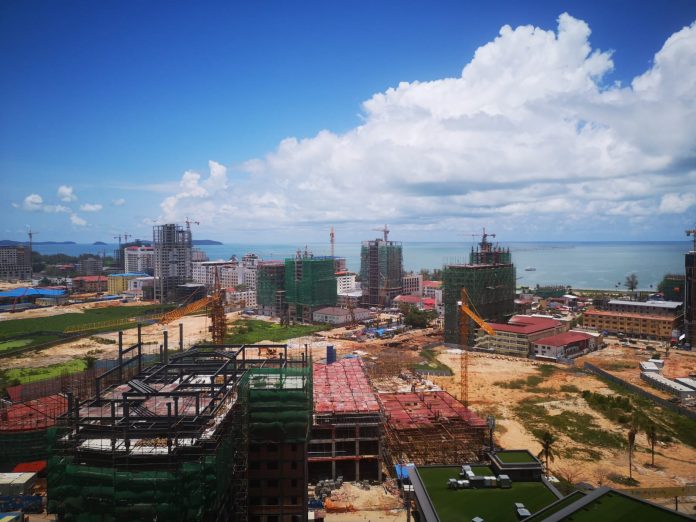Sihanoukville (MNA) – Sihanoukville, Cambodia, appears to be on the verge of a construction boom, with the number of casino licences in Preah Sihanouk province reaching 88 in 2018 alone.
Around 150 registered casinos operated in the whole of Cambodia at the end of 2018, according to data from the country’s Ministry of Economy and Finance.
Chinese money has fuelled a development race (pictured above), and many Chinese casinos now operate in Sihanoukville.
Jin Bei Group CEO Anson Chan seems confident in the future of the local casino industry, in part due to the direction that Beijing is taking.
Jin Bei Group, which runs the Jin Bei Casino and Hotel in the coastal city, has been open since 2017, offering up the first seven-storey entertainment complex in Sihanoukville, with 39 gaming tables, 50 slot machines, and two VIP rooms.
“In February this year, Sihanoukville released a 2030 Master Plan that will align with the One Belt, One Road, development opportunity. In the master plan, the vision is for Sihanoukville to develop as a global tourism city,” he told MNA.
However, Ben Lee from iGamiX believes that the majority of market is dominated by online casinos, and that the number will continue to rise until new regulations kick in.
“The majority of them [casinos] are online. We expect about 50 per cent of them to drop off once the government brings in their gaming regulations which requires a capital investment of US$50 million (MOP404 million) over 5 years,” he said.
According to the expert, this will take place “tentatively” in September this year.
At the present time, those who wish to register a casino in Sihanoukville can do so by paying an annual registration fee of US$40,000, which explains the high number of small players entering the market.
Chinese companies are incentivised to register online casinos in Cambodia, as online gaming in China is illegal.
Victor Chong Wei Yong, the marketing director of Jin Bei Group, told MNA that the market is “self-regulated” at this point in time, although he welcomed the prospect of better regulations and was confident the company he represents would have the capacity to deal with it. “We adopt the best practices in Macau and in Singapore and we put in place here. The [Cambodian] government does not have the know-how.”
Chong said that the regulation process generally takes a few years to set up, in the case of Cambodia “it was going take some time,” and more regulations would be good for the industry as a whole.
Jin Bei Group will continue to develop the second and third phase of its casino resorts, with the goal to launch both by the end of the year.
Lee was skeptical on the number of people who would physically go down to Cambodia, however.
Existing legislation bans Cambodians from entering casinos, although local operators seem to be aimed purely towards a Chinese audience.
“I don’t think the serious players go to Sihanoukville to play. You have the mass Chinese tourists whose tour group leaders have been incentivised to take their groups there. You have the online staff who have nothing to do on their time off. These are the two main groups of actual visitors to those casinos,” he noted.
“The real money is in the online,” he added.
*MNA was invited on a press trip by Jin Bei Group
[updates add quotes from Jin Bei Group’s marketing director on paragraphs 12 and 13]





















